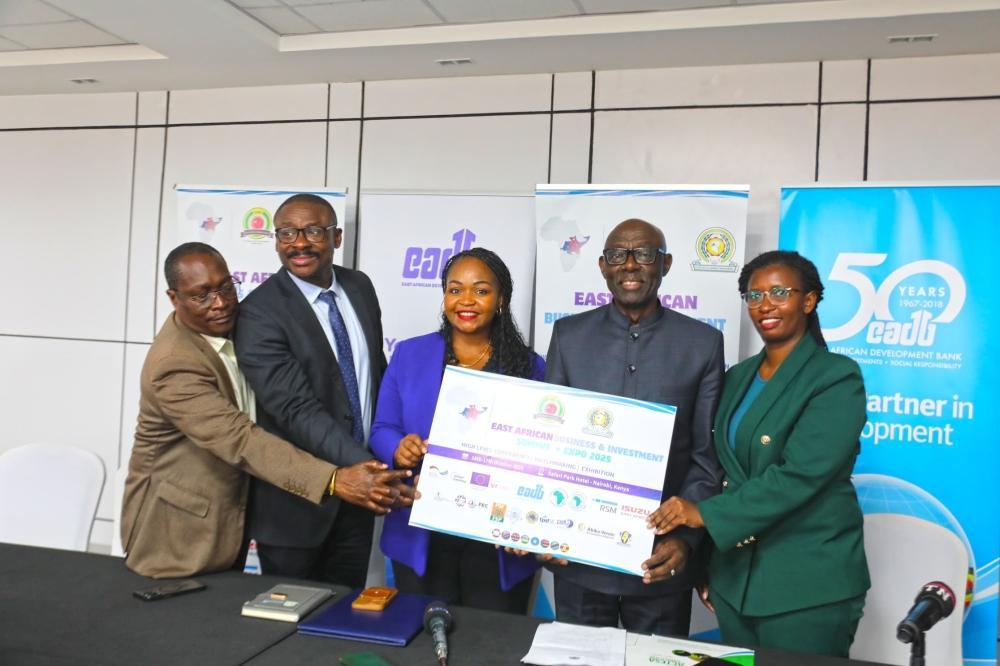Africa-Press – Rwanda. The Ministry of Foreign Affairs and International Cooperation has endorsed over 10 policy priorities to be considered during two upcoming regional meetings.
The summits include the Meeting of the Council of Ministers, scheduled from August 25 to 29 in Arusha, and the East African Business and Investment Summit and Expo 2025, set to take place from October 16 to 17 2025 in Nairobi, Kenya.
Clementine Mukeka, the Permanent Secretary in the Ministry of Foreign Affairs, stated that the East African Community (EAC) is the most united trading bloc in Africa stressing that the government is committed to working with the private sector to boost trade among EAC member countries and improve citizens’ livelihoods.
“Last year, intra-EAC trade reached 13%. That is not insignificant—but still, only 15% of our trade is happening within the region. Just 15%. And that’s only half of what we’ve set out to achieve. But halfway isn’t good enough—not for our businesses, not for our citizens, and not for the future we all keep talking about,” she said.
The EAC is undertaking comprehensive steps to deepen regional integration and stimulate economic growth through a range of strategic trade and industrial priorities.
Chief among these is the uniform application of the EAC Common External Tariff (CET) 2022 version and the elimination of non-tariff barriers (NTBs), both of which aim to streamline cross-border trade.
The review of the EAC Rules of Origin (ROO) and the operationalisation of the EAC Trade Remedies Mechanism are also underway to ensure fair trade practices.
The review should aim at stimulating industrial growth through the promotion of regional value addition and make the EAC ROO more flexible and simpler to comply with by producers and manufacturers of the region.
EABC has urged Partner States to provide a clear timeline for the ratification of the Amendment of Article 24(2) of the CU Protocol, including Article 24 (2) (a), to enable the establishment and operationalization of the Committee on Trade Remedies.
The mechanism will make it easy and cost-effective to address trade-related disputes such as NTBs related to Rules of Origin, taxes, and administration restrictions.
Further efforts include harmonising domestic tax regimes and standards across member states, liberalising trade in services, and combating illicit trade.
The EAC also prioritises the free movement of workers and enhanced engagement with third parties on trade and investment agreements.
The implementation of the COMESA-EAC-SADC Tripartite Free Trade Area (TFTA) Agreement also marks a crucial step towards broader regional economic integration.
Special emphasis is being placed on empowering SMEs, youth, and women in business, while advancing sustainable trade and economic resilience in response to climate change through Environmental, Social, and Governance (ESG) measures.
The formulation and execution of a robust industrialisation policy and strategy remain central to the EAC’s long-term vision for inclusive and sustainable growth.
EABC urges Partner States to expedite harmonization of domestic taxes (excise duties, VAT, Income Taxes & Export taxes).
“Partner States should finalize consultations on the minimum and maximum excise duty rates for non-alcoholic beverages, tobacco & other nicotine products, and fossil fuels.
As they expedite the harmonization of domestic taxes, Partner States should immediately eliminate all discriminatory fiscal measures, taxes, fees, levies, and other charges of equivalent effect on EAC-originating goods.”
The statement added: “Importantly, Partner States should align the interpretation in National Legislations on “imports and exports with EAC Community Legal interpretation to avoid treating goods transfer from other EAC Partner States less favorably than similar or like domestic goods.
Imports and exports should mean out of EAC Customs and EAC originating goods traded with the Region should be considered as transfer.”
Dennis Karera, Vice Chairperson of the East African Business Council (EABC), noted that regional countries must approve reforms to establish a special committee dedicated to addressing trade disputes promptly. This Committee on Trade Remedies is expected to help reduce trade barriers and facilitate smoother trade across the region.
Charles Omusana, the EAC Principal Economist, remarked that the EAC’s Customs Union and Common Market are crucial mechanisms for improving the lives of East Africans by creating better trade and business opportunities.
Adrian Raphael Njau, Acting Executive Director of the EABC, commended the Government of Rwanda for its support of the private sector and its role in hosting significant trade discussions. He recalled that a previous meeting in Kigali resulted in a declaration outlining several challenges, including high export taxes, unfair milk trade regulations, and costly road fees. Some of these issues have already been addressed, such as the removal of the tax on hides and skins.
He also called upon all EAC member states to fully adopt the Single Customs Territory system and apply uniform import tax rates throughout the region.
Didace Mparirwa, a representative of the agriculture and livestock sector within Rwanda’s Private Sector Federation, said that the meeting would help identify ways to strengthen Rwanda’s trade relations with neighbouring EAC countries.
The recent two-day meeting to discuss the forthcoming investment and business summit brought together 55 participants from both government and the private sector to explore strategies for eliminating trade barriers. Discussions covered topics such as harmonising domestic taxes (e.g. VAT and income tax), removing unfair charges on regionally produced goods, ceasing the treatment of intra-regional products as foreign imports, and updating laws to eliminate non-tariff barriers (NTBs).
Dennis Karera further stated that this year’s Summit will focus on strategies to increase trade and investment within East Africa and beyond. The Summit is regarded as East Africa’s premier platform where business leaders, policymakers, investors, and development partners convene to discuss trade, investment, and regional cooperation.
The 2025 edition will evaluate progress since the 2023 Summit held in Uganda, address current trade and investment challenges, present new business opportunities in an evolving global context, and shape regional policy through formal recommendations.
Key global and regional issues will be discussed, including the African Continental Free Trade Area (AfCFTA), digital transformation and artificial intelligence (AI), climate change, the removal of intra-EAC trade barriers, support for small and medium-sized enterprises (SMEs), and efforts to make cross-border trade simpler and more affordable.
For More News And Analysis About Rwanda Follow Africa-Press






